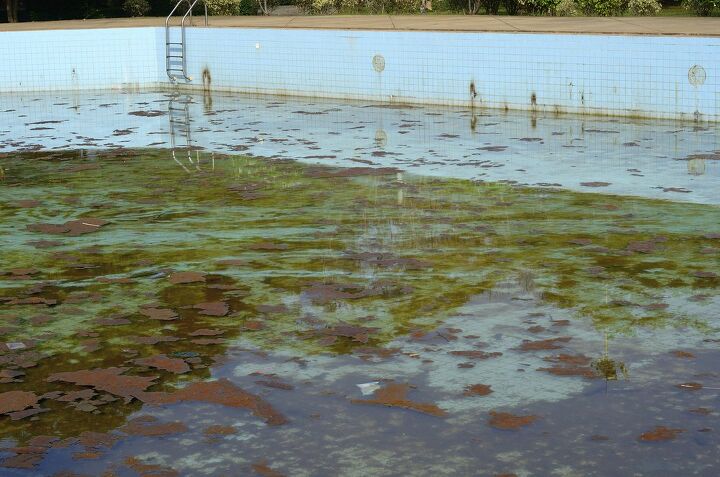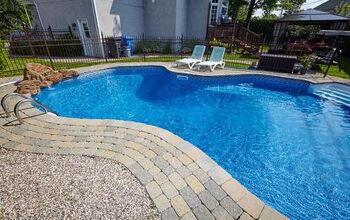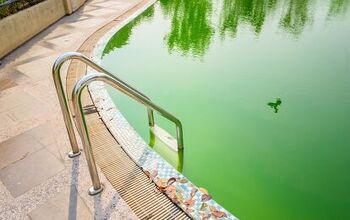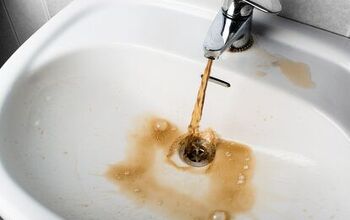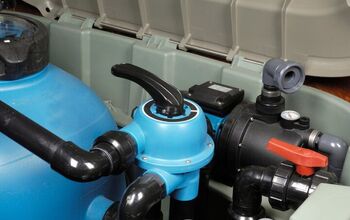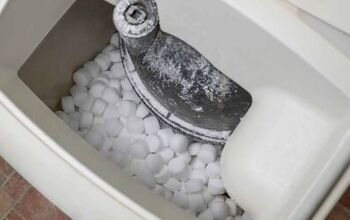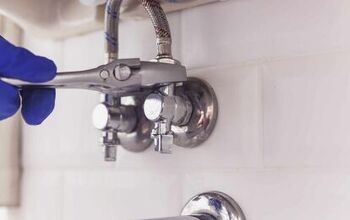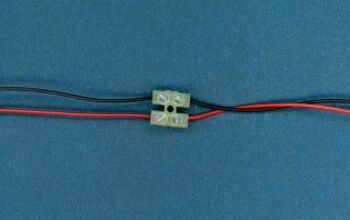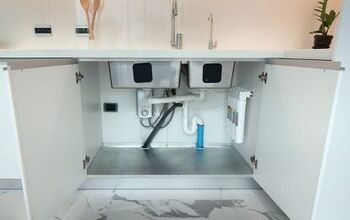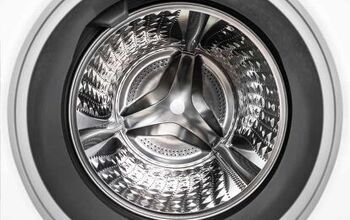Pool Water Is Brown? (Fix It Now!)

The color of your pool water can tell a lot about your pool’s health. That’s why we all naturally gravitate towards pools that have rich blues, crystal clear hues, and maybe a little turquoise in them. One color no one wants to see in a pool is brown. That’s a major ick right there, and it’s enough to have people run in the opposite direction. So, what is brown pool water doing in your pool?
The most common reason for brown water is an increase in metal oxidation (rust) from metals in your pool. If the brown color is mostly found at the bottom of your pool, it could also be caused by brown algae. Most brown pool water can be cleared up through the use of ascorbic acid, debris removal, algae treatments, and heavy pool shocking.
It’s normal to feel a little horrified by the sight of brown pool water. Actually, it’d be weird if you didn’t act worried. Let’s talk about how you can get rid of it.
Do You a Need Pool, Spa, or Hot Tub Contractor?
Get free, zero-commitment quotes from pro contractors near you.

Why Is My Pool Water Brown?
Let’s start with the two main culprits: metals and algae. If your entire pool is turning brown, the culprit is a high level of metals in your pool. The metals rusted, giving your pool water a brownish-orange color. If the water is brown primarily at the bottom, you have a brown algae buildup you need to take care of.
If you have brown pool water, you might feel ashamed or embarrassed about it. That’s understandable and to be fully expected. However, it’s important to understand that having brown pool water isn’t necessarily your fault.
Pollution causes metal deposits in your pool water. Pollution isn’t very escapable these days. We live in a time of acid rain. Acid rain contains metals. When it rains, the metals can runoff into your pool. Sometimes, you might even have metals that are airborne as a result of heavy pollution. (Looking at you, San Francisco!)
How To Turn Brown Pool Water Clear Again
Now that you understand the basics, we’re going to suggest doing a treatment that will help you get rid of both algae and the metals inside your pool.
- Start off by doing a shock treatment if you see algae at the bottom of your pool. The shock treatment should be able to get rid of the brown algae. Once your pool has been shocked, use a brush to scrape away the algae at the bottom of your pool. If you don’t notice an improvement, call a pool professional as this could be a metal-based alga that requires a special algae killer.
- Next, grab a pound of ascorbic acid and dump it in your pool. Don’t ask why, but ascorbic acid lifts metal stains. If you notice that your brown pool is lightening up, then it was a metal stain all along. Let the pool pump run for 1 to 2 hours so that the acid gets the full stain lifted.
- After your stain is lifted, turn off the pool pump. Because you’re going to need to remove debris soon, you can’t have your pool water being circulated. Things need to settle!
- Pour a full 16-ounce bottle of Revive into your pool. The Revive is what’s going to get rid of the iron for good. It turns the iron into sediment, which then gets lowered to the bottom of the pool.
- Let the Revive do its work. Leave your pool alone, untouched, for a full 24 hours. You need to give some time for the Revive to fully work its way through the pool.
- Remove the debris using a pool vacuum. We strongly suggest being thorough here. Oh, and make sure the vacuum is put on the “WASTE” setting. It’s amazing how much sediment can slip past the radar if you’re not careful!
- Turn your pool pump back on. The sediment and metals are gone now, so you can go back to pumping stuff.
- Rebalance your pool’s water levels and keep maintaining it. Once the iron has been removed and the algae is gone, you can chlorinate and rebalance your pool’s alkalinity if needed.
When Should You Call A Professional?
Even though you can DIY your pool’s water fix, most people don’t want to do it. For some of us, the sight of brown water alone makes us get all squicky. Though a call to the professionals can always help, we noticed three main situations where calling someone is a smart move…
The Treatment Didn’t Work
If you tried to remove algae and metal stains, only to see no improvement, that’s bad. Most of the time, our routine will clear everything up. However, there are certain types of algae that are metal-dependent. When this happens, you need a specialized algae killer to get rid of the stains.
The problem is, algae is not a one-size-fits-all issue. You may have to call a professional to run a test that tells you what type of algae killer you need.
You Are Uncomfortable Treating Your Pool
Let’s just admit it. Pool maintenance means that you will have to deal with chemicals. Lots of them are caustic. Some can be lethal. While pool care instructions can be pretty straightforward, it’s easy to get worried about working with a pool. If you’re afraid of DIY maintenance, you can always give a cool pool guy a call.
There’s A Biological Reason For Your Brown Water
Sometimes, leaves get caught in the pool and dye the water brown over the course of several months. That’s fine, because our treatment should work. However, there are other reasons why a pool’s water might be brown. Organic reasons, such as the ones below, signal that you need professional treatment:
- An animal died in your pool and rotted away. It happens. And when it does, it’s not likely that a shock alone will be enough to fully sanitize your pool. Mold, algae, debris, and even viruses could take a while to remove. This is especially true if there is already serious signs of decomposition.
- Someone or something went #2 in the pool. While you might be able to chlorinate and filter this away, we really suggest hiring pros for a more thorough cleaning. This is especially true if you only found out about the mess days after the event occurred.
- There is something you can’t recognize building up in the pool. No, we’re not talking about pink slime. We’re talking about real rare algae or molds. Sometimes, like in this article, it could even be larvae.
Note: In extreme situations, you may actually need to call a specialty HAZMAT cleaning service to sanitize your pool. This is highly unusual, though. You shouldn’t consider this unless the mess is totally out of control or if you have been rejected by multiple companies.
How Much Does It Cost To Remove Brown Water From Your Pool?
Getting your pool professionally cleaned is going to cost a bit, but it’s worth it. The price all depends on how murky the pool is. If your pool is light brown or greenish-brown, it probably is a light cleaning. Light pool cleanings may cost anywhere from $150 to $300, and will take around three hours of work over the course of several days.
If you have a brown pool that is murky to the point of opacity, then you have a heavy cleaning. Heavy cleanings require at least six hours of work and may also need special equipment. Deep cleanings cost between $450 to $700. If you are dealing with a biological agent (like a dead animal or feces), you may also have to pay an occupational hazard fee.
Do You a Need Pool, Spa, or Hot Tub Contractor?
Get free, zero-commitment quotes from pro contractors near you.

Related Question
Pool water can’t always be prevented from changing colors. However, you can usually curb the effects of your local environment through regular pool maintenance. If you live in an area that has heavy metals in the air and rain, getting a pool cover is an effective way to reduce your water’s exposure to metals in your pool.
Can leaves turn a pool’s water brown?It’s possible, but it’s highly improbable. If dead leaves are left in the pool for weeks or months on end, then they can start to create a “tea” that turns the pool brown. This is why you should always cover your pool when you are seeing the leaves change. It’s also a good idea to fish out leaves as soon as you see them hit the water. The longer they’re there, the more likely they are to discolor your pool.
Why did my pool turn green?The most common reason for a green pool is an increase in algae levels. Green algae is the most common type of algae that you can find in a pool. Algae killer, followed by a scrub-down, a vacuum session, and a shock treatment, is more than enough to remove most of the green in your pool. To avoid seeing your pool turn green, make sure to keep abreast of your maintenance.

Ossiana Tepfenhart is an expert writer, focusing on interior design and general home tips. Writing is her life, and it's what she does best. Her interests include art and real estate investments.
More by Ossiana Tepfenhart



